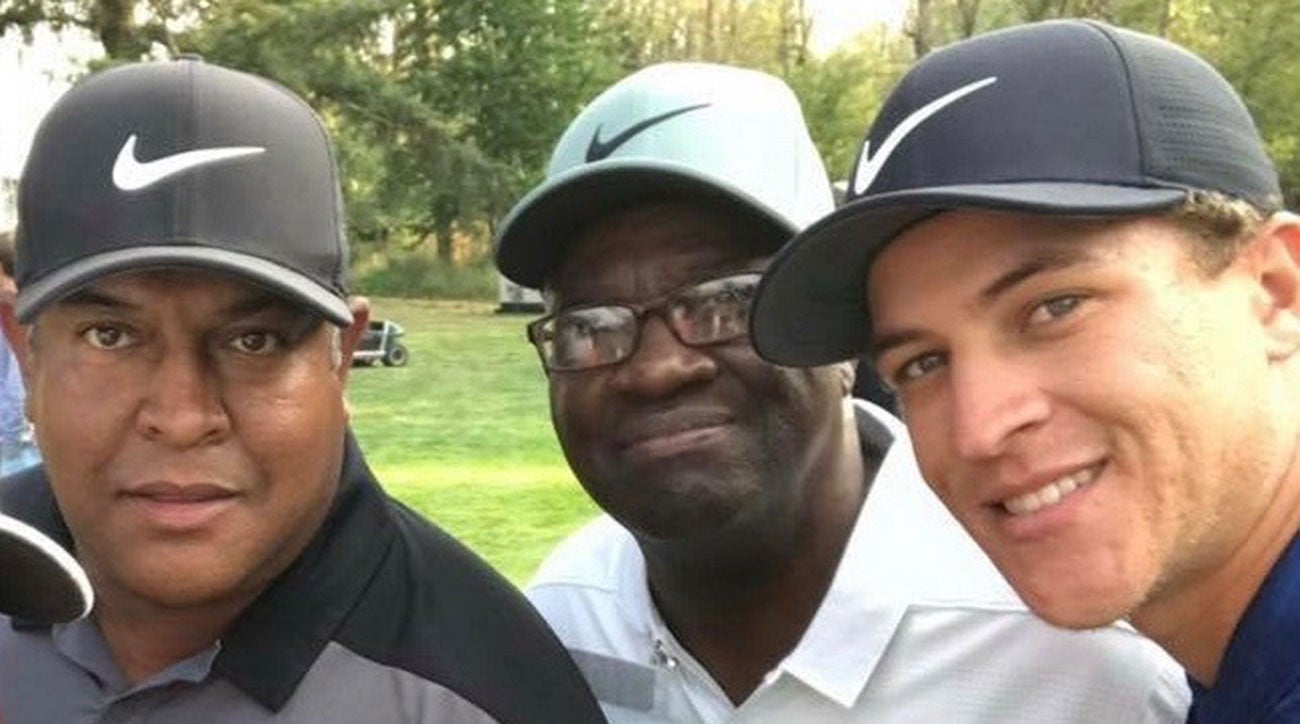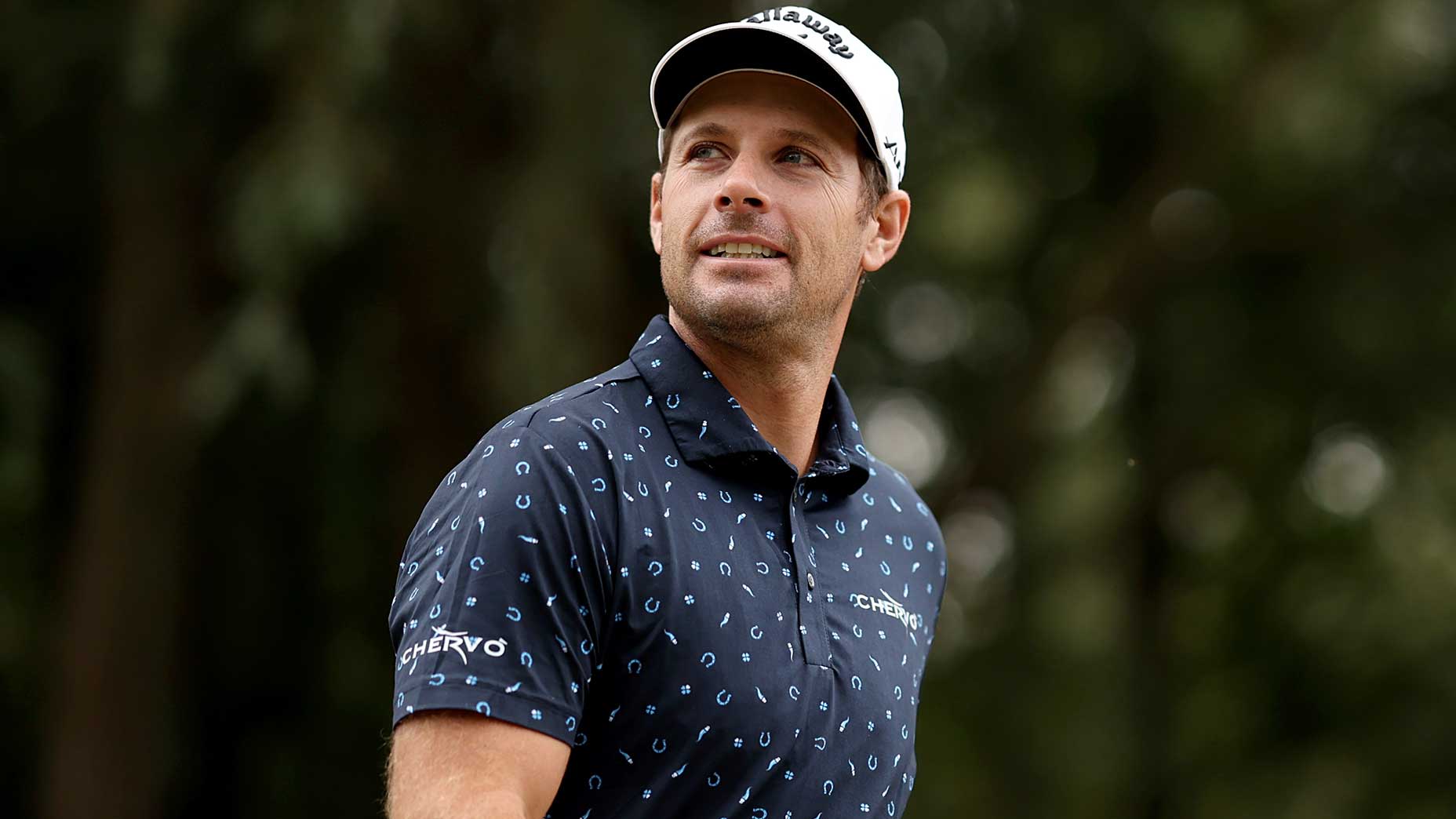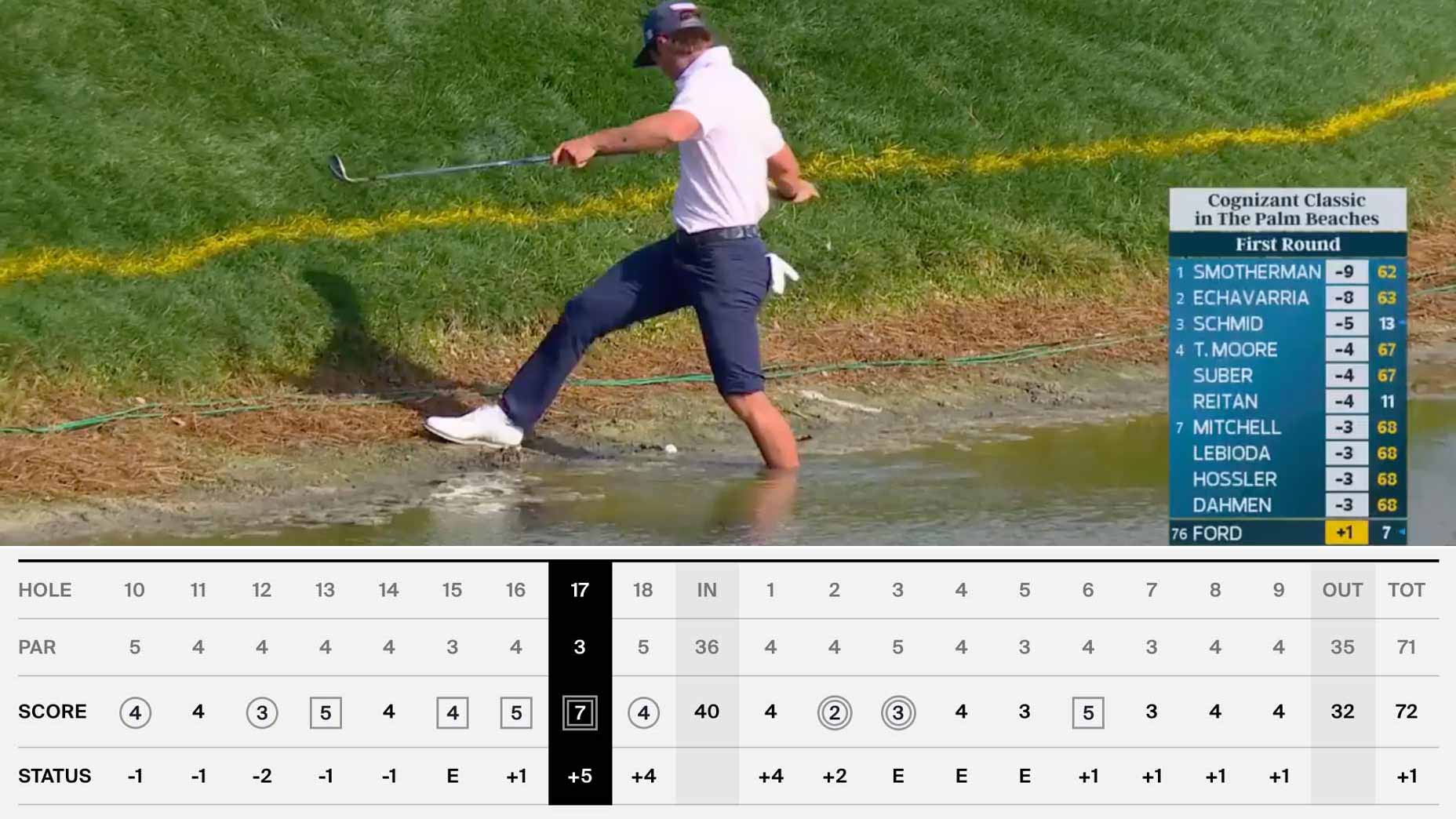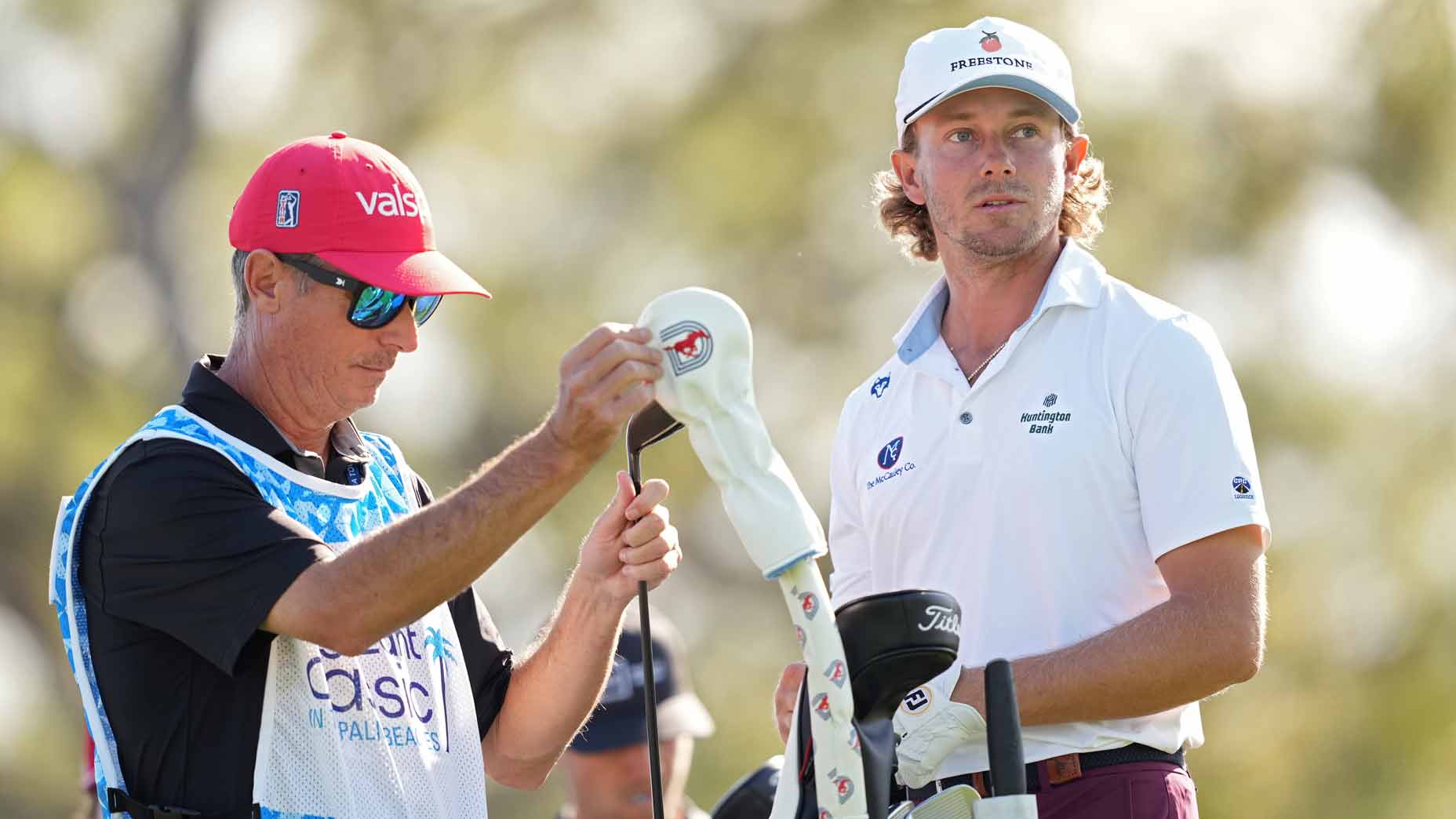SEA ISLAND, Ga. — Whenever the kid swings a club, there are, in a manner of speaking, six hands on it. The kid’s. The father’s. The grandfather’s.
The third generation is Cameron Champ, 23, who holds his Ping clubs with an interlocking grip. Maybe you saw it, over the weekend, as he tried to win the RSM Classic on a course that could barely contain him. He makes a swing that is devoid of violence or recklessness that can fly a ball 360 or more yards in still, warm conditions. Easily. Cameron Champ, if you’re just catching up here, is the slender and sinewy Californian with Nike duds, a killer smile and cool demeanor, who won the Tour event in Mississippi a few weeks ago. That earned him a bronze rooster, a $792,000 check and a lot of attention. He came here, to this old and genteel Southern resort built on a former long-staple cotton plantation, looking for a win that would get him in the Masters.
The second pair of hands belongs to Jeff Champ, Cameron’s father. On Thursday afternoon, Champ had his cellphone in his right hand, hovering above a gallery rope here, because his son was playing with Davis Love III, of Sea Island and the World Golf Hall of Fame, and Jeff knew that if he didn’t get a snap of those two golfers shaking hands on the 18th green, who would? Jeff’s left hand is another story. It was once struck by an errant Randy Johnson pitch in an Instructional League game. Soon after, Jeff was out of baseball and back home in Sacramento, selling trophies and T-shirts and scrimping and saving — with his wife, Lisa — to support Camerons’s junior-golf habit.
The third pair of hands belong to Mack Champ, Cameron’s 77-year-old golf-nut grandfather, who, during the RSM event, was 2,700 miles away, in his one-story house in Sacramento. Mack, a widower and a retired Airman, had his eyes on the Golf Channel coverage, because when Cameron plays, he watches, though that may convey the wrong idea. Because if there’s anybody even remotely linked to the PGA Tour who knows there’s more to life than making the top 125, it’s Mack. The senior Champ grew up in the 1940s and ‘50s in greater Houston, where he had to place his dark hands against downtown drinking fountains marked COLORED when he wanted water.
Cameron Champ, Jeff Champ, Mack Champ. CHAMP. Some family name, right? The headline writes itself. Late on Sunday, Cameron Champ was knocking on the door. Golf Channel was going to a TV break and an announcer said, “Cam Champ, trying to be the champ.”

***
Even though Davis Love is 54 he still has speed in his swing, and he still drives it long and in play. Cameron Champ was hitting his bent 3-iron — a driving iron, really — even with Love and past him in the first two rounds. Champ’s bag, at the RSM Classic, went driver, strong 3-iron, strong 4-iron, weak 4-iron. He can dismantle a course with his long irons, but it’s the driver that grabs your attention. On any given hole, he can blow it 50 yards past many of his playing partners and you’ll see him drive it past Brooks Koepka and Tony Finau, too. In warm weather, on a long and wide hole where he won’t run out of fairway? Please.
And he does it with a normal-looking swing. Champ’s backswing is not crazy-long, as John Daly’s was, when he was the game’s country-strong golfer and new-guy crowd favorite. Champ doesn’t have a screaming lag move, as Sergio Garcia did when he first came on the scene. You know how Bubba Watson has those dancing feet after impact, and how Justin Thomas’s heels are high in the air when he says pow? Champ has none of that. He stays planted. He has a narrow stance, hits it low, fades a butter-knife fade. A funny thing is to see Champ, modest and unassuming by nature, keep walking and walking when the other guys are at their tee shots.
There have been other Cameron Champs, over the years. Rickie Fowler in 2010. Robert Gamez in 1990. Charles Howell III in 2001. Howell, who picked up his first title in 11 years at Sea Island on Sunday, remembers what it’s like, to stand on the range and have Curtis Strange checking out your move. “But [Champ] has 20 more miles of speed than I did,” Howell said. “And he can putt.”
Champ climbed into contention by having a solid Thursday, an excellent Friday and a solid Saturday. Champ’s shot-of-the-day on Thursday might surprise you. It was a downwind 60-yard pitch off a firm Bermuda-grass fairway with a hooded sand wedge. The shot was on a string, barely higher than the flagstick, landed and stopped just about dead, a yard or so from the hole. Champ was already long when he started working with Sean Foley eight years ago. (John Wood, Matt Kuchar’s caddie, who played baseball in Sacramento with Jeff Champ in the 1980s, was the Foley-Champ matchmaker.) You can’t teach speed. But other skills can be taught, that hooded wedge among them.
Foley and Champ talk on the phone most days. “It’s a big brother-little brother kind of thing,” Jeff said at Sea Island. They talk about full swings and half swings, pitching the ball out of Bermuda, out of poa annua, out of bent. Foley knows, and Champ is learning, that you have to make adjustments week in and week out, to make it on Tour. They also talk about how rounds and tournaments unfold and how practice sessions and careers unfold. They talk about things that have nothing to do with golf, not directly. All the while, the bond between them grows deeper.
“You have to manage your expectations,” Cameron said after his first round at Sea Island, talking about what he has learned so far in his PGA Tour career. (He’s played in 10 Tour events.) “There might never be another Tiger. Dustin Johnson has won, what, 19 times on Tour? And he’s played in over 200 events. [Actually 242.] Nobody wins every time they play. Right now, I’m working on playing four solid rounds every time I play. If I play four solid rounds, I can contend. I’d like to play in all four majors, play in the FedEx events, play at East Lake.”
The most experienced Tour player in the world wouldn’t challenge a word of that. When you’re talented and starting out and people are looking at you, it’s important to manage expectations. Because Champ is a young, promising, athletic, smart and handsome golfer from California, in Nike duds, and from a mixed-race unassuming family with a military strain in it, with a doting, baseball-playing father, people might start thinking crazy things. Don’t start thinking crazy things! Champ is good and likely getting better. What he says is undoubtedly correct: If he plays well for four straight days, he’s going to contend. If he contends enough, he’s going to win some of them.
The good teachers learn from their students. The good teachers have a compulsive need to share. The Foley-Champ relationship, Jeff Champ believes, is why Cameron knows more than your ordinary PGA Tour rookie. He’ll tell you that his son and Foley connect on every possible level.
“Who do you consider to be more black, you or Sean?” Champ was asked on Thursday, his workday long done. He and his father stayed in a private home last week, about 10 miles from the course, with friends of friends.
Champ, a bright, personable Texas A&M graduate, laughed and considered the question. He has one black grandparent. Foley, a white Canadian who lives in Orlando, went to a historically black school, Tennessee State University, and was a serious student of black culture even before he went there. Foley, who formerly taught Tiger Woods and is Justin Rose’s longtime teacher, has an abiding interest in black artists and writers and especially musicians.
“Technically speaking, me,” Champ said, taking on the tongue-in-cheek question. “Sean’s not mixed to any extent. But the way Sean is? You’d have to say Sean.” The kid was having fun.

On the course, Champ is all business. Love was struck by how reserved and quiet Cameron was as they played. Love’s son, Dru, also in the field, is 24 and gregarious. But even for people playing tournament golf for a living, how many hours a day are you actually on a course? Tour players have off-course lives and off-course histories, of course. Every last one of them. But Champ has a personal history that makes his path to the PGA Tour beyond unlikely. The length is one thing. The life and times of the man who nurtured him in the game is another thing all together.
***
Mack Ray Champ was born June 1, 1941, at home, in Texas, when separate and unequal was the way of the land. Cameron’s paternal grandfather attended segregated schools all his life. His people, the men among them, were sharecroppers and farmers. “My mother did domestic work for white people, like a lot of black women did,” Mack said last week. For most of his boyhood, Mac lived in country houses with no indoor plumbing or electricity. He had a brother who was killed in an unsolved murder.
Mack was given a new birthdate (June 5, 1941) and lost his middle name when he needed a legal document for the first time in his life. Turns out, the United States Air Force requires a birth certificate for its enlistees and Mack Champ had never had one. What Mack knows about his family’s history, and he knows a lot, he got from an aunt who died several years ago at 103.
His first exposure to golf came in the late 1940s, caddying at the nine-hole course in Columbus, Texas, with his brothers, banking 45 cents a loop. “It’s still there today, off I-10,” Mack said of the course. “We couldn’t play it. The golf courses, the hamburger stands, the restaurants, they didn’t allow blacks. The movie theaters had a section for blacks. We would have played, if we could.”
Mack first saw professional golf on a neighbor’s black-and-white TV in the late 1950s, and remembers being drawn to Arnold Palmer’s brawn and style. He didn’t actually play golf until he found himself stationed in Europe and England, courtesy of the Air Force, in the early 1960s.
“There was a driving range on the base for our recreation. I said, ‘I don’t have no clubs.’ They said, ‘You can use these clubs.’ You could hit a hundred balls, all the balls you wanted. I practiced and practiced. My first full 18-hole round, with a scorecard, was on a tight course called Windy Acres on the North Sea. June 1965. I knew the rules and the etiquette. I shot 132. I was so happy. I had the bug. I was gonna get better. I bought Sam Snead’s Natural Golf. In September 1967, I had my first hole-in-one. Spalding sent me a certificate and whiskey glasses. I still got ‘em. I’m gonna give all that stuff to Cameron.” How the kid is going to play his grandfather’s 8-track tapes of Arnold Palmer’s swing is a problem for another day.
This next part of the Champ family life story is inadequate but at least it’s a start. Mack and his white, European-born wife, Lulu, first returned to the United States from a U.S. Air Force base in England in the mid-1960s. They lived on a base in Texas. Within that federal facility, their interracial marriage was recognized. The couple got second looks, but the marriage was accepted, at least legally.
“But the moment I walked off that base, I was subject to arrest,” Mack said. He tells the stories of his life with the relaxed ease that comes with age and years. He tells them like a teacher. Mack was subject to arrest because Texas law at the time prohibited interracial marriage.
Their son Jeff was born in 1967, the year the U.S. Supreme Court ruled that states could not reject marriage-license applications on the basis of race. The Champs moved to Sacramento in part because they felt Californians would be more open to their marriage. Jeff, a natural athlete in every season who was sometimes mistaken for being a Pacific Islander, went to a large, integrated public high school in Sacramento in the 1980s. It was nothing like the tiny all-black high school his father had attended in Texas in the 1950s, and nothing like the charter school Cameron attended in Sacramento just a half-decade or so ago.
The only sport Jeff didn’t play was golf. Mack was the golfer in the family, able to break 80 wherever he played, and sometimes 70. Today, Mack is a beloved figure in the Sacramento public-golf community. It was on those public courses, and later a few private ones, where Cameron, guided by Mack, learned to play. Mack teaches golf in Sacramento’s well-developed First Tee programs, in which Cameron and his kid sister, Madison, came up. Mack is particularly devoted to a First Tee program for young golfers with autism, like Madison, and other disabilities. John Wood has known Mack since he was a little kid. “The man’s special,” he said last week.
“Madison is a hell of a golfer!” Mack said of Cameron’s sister, two years younger than Cam. The grandfather is a full-volume talker. “She can hit that ball, and she could putt for her brother.” On tournament Sundays — you could see this in the Sea Island event — Cameron wears a blue shirt, as a public nod to the Autism Speaks movement, which wraps itself in blue as the breast-cancer research movement uses pink. Madison, who has significant struggles in communication but uses text messaging effectively, does things her own way. She has an aversion to big-headed metal drivers, so she hits a small wood-headed driver instead. Maybe it’s a Champ family thing. Her grandfather still plays with his old Ping Eye-2s. Karsten Solheim, the designer of that club, said years ago that his company never made a better iron.
Jeff played college baseball at San Diego State and was drafted by the Baltimore Orioles as a catcher with a pure stroke. He played two years of low-level professional ball, came home and married a single mother with two children. Lisa and Jeff then had Cameron and Madison. Their small family business — selling trophies, team uniforms and T-shirts — never left the family anything close to flush. Cameron grew up in a three-bedroom rental home where his parents and sister still live today. Cameron lives with friends in San Antonio. When he goes home to Sacramento for Thanksgiving this week, he’ll be back in his childhood bedroom, frozen in time.
Mack introduced Cameron to golf as a toddler swinging plastic clubs. Grandfather picked up grandson after the final bell all through Cameron’s school years, to take him to courses where they would chip and putt, hit balls and play nine holes. “He’d wear me out,” Mack said. “I’d say, ‘I’m tired, I got to go home.’ And he’d start crying.”
Mack and Lulu owned a one-story house with an extensive garden and a massive oak. “Cameron would hit balls over the house, back and forth. He’d hit it through the limbs of that tree,” Mack said. “I was his teacher until he was about 11. A lot of time, he’d overthink things. I’d tell him that you just had to be natural, like Sam Snead. Whatever the shot calls for, you hit that shot. If you do it right 70 percent of the time, you’re going to have a pretty good score. I made it fun for him.
“Now he has a game that’s foreign to me. They say on Golf Channel that you got to be able to explain your swing but sometimes you can’t. The speed Cameron has, no teacher could teach it. I’m not a physicist, but I can tell you that.”
One of the things that most pleases Mack about his pro-golfer grandson “is his desire to give back.” The family has started a charity — the Cameron Champ Foundation — which plans to manage the par-3 Foothills Golf Course in Sacramento, where Cameron and Mack played hundreds of times. “What Cameron and his dad are going to do is to create opportunities. There are kids in gangs, kids with no hope, and we want to try to get them into golf. Cameron knows that if people didn’t give to him, he wouldn’t be where he is.”
John Wood is surely correct: Mack Ray Champ — he still uses his middle name even if his birth certificate does not — is a special man.
Mack was asked last week where the family name comes from, the one that seems so perfect for his nothing-but-promise grandson.
“It comes from Virginia,” he said quietly. “It’s a slave name.”
***
Wednesday at Sea Island was nasty, cold and windy. Cameron was playing in the afternoon in an 18-hole pro-am with three BMW executives. Jeff followed them for nine holes before calling it a day. On his way into the warm, plush clubhouse, dripping with Southern charm, Jeff met Love, the tournament host. Love was wearing a camouflage vest with an embroidered polo horse on it, Ralph Lauren’s iconic logo.
“I’m looking forward to playing with your son,” Love said. He’s three years older than Jeff. “I’m not looking forward to seeing him outdrive me by 50.” Love, like his namesake father, a longtime Sea Island teaching pro, has a knack for saying the right thing.
Jeff looked like he’d been having these kinds of conversations all his life. You would never have known how new he was to it all. It was just 15 months ago that Cameron Champ was the unknown kid paired with Steph Curry in that first Web.com event. Nobody was paying particular attention to Cameron that day, except maybe Curry. Jeff talked hoops and golf that week with the Warriors star. Steph Curry! “One of the most famous athletes in the world,” Jeff noted. Golf can take you to amazing places.
“I don’t know how this pairing came about — I had nothing to do with it,” Love said. The threesome’s third was Patton Kizzire, a Sea Island resident and a native of Montgomery, Ala. “Maybe it was a TV thing. TV gets to make, like, one or two pairings a week,” Love said. There are few players who know more about the inner workings of the Tour than Davis Love.
In short order, hanging out near the clubhouse, Jeff met Kizzire and Davis’s daughter, Lexie, and granddaughter, Eloise. Jeff was now behind the curtains, seeing the other side of daily life on Tour, a life that’s hanging on by life support in this age of hype and rush and social media. It was a moment that reminded you that the Tour is, or can be, more of a caravan than anything else, and not just 150 independent player-CEOs, jetting in and out as it suits them. The Sea Island Golf Club abuts a private airport, with all manner of planes coming and going. Jeff, the son of a retired Air Force master sergeant, noted the size of an incoming jet. It was an elegant sight, if you’re into that sort of thing.

In the plush comfort of the clubhouse — the gas fireplace was going full blast — Jeff talked about the impact Wood made on Cameron’s development, when the caddie, then working for Hunter Mahan, connected Cameron with Foley. Jeff talked about his family cars, a 2006 and a 2012 with more than 350,000 miles on them, all in, and the sacrifices the family made to get Cameron to junior tournaments and everything that goes with that.
He showed the logo that a friend was developing for branding purposes, a capital C artfully containing a smaller one within it. He detailed, by way of an hours-in-the-day analysis, how much more time Cameron had to practice and play each afternoon after he and Lisa took their son out of his public high school and had him home-schooled in a program linked to a bricks-and-mortar charter school. According to the father, Cameron was an excellent student.
Jeff described, movingly, how he and Lisa were a team and that both their children had special needs, albeit in different ways. (In a separate interview, Cameron talked about how he knows one day responsibility for his sister will likely fall to him, and that he is ready for it. Jordan Spieth has surely had similar conversations, as has Samantha Els, Ernie and Liesl’s daughter. Jordan’s sister, Ellie, and Samantha’s brother, Ben, both have profound developmental issues.)
Jeff described his admiration for both his late mother and his father and what they had endured in the name of love and marriage. He explained how Cameron found his own way to Texas A&M, in College Station, without knowing the story of how his grandfather, as a 19-year-old Airman, was once refused at a hamburger stand there. Jeff explained the process by which he and Cameron selected Chris Armstrong of Wasserman to represent the young golfer. It is a coincidence, Champ said, that Armstrong represents Foley as well.
Then Jeff made a map of his Sacramento neighborhood, indicating with a pencil the streets Cameron was not allowed to cross. “We have a good neighborhood,” Jeff said. Nearby areas worried him. He recalled Cameron’s first experience playing playground basketball at Robert Frost Park, near their home and on the edge of where gang activity, drug sales and gun violence can occur on any given day.
“All right,” father said to son, as Jeff recalled it. “You can go there. Take your bike. I’m gonna come down later to check it out. Don’t tell anybody I’m your father. I just want to see it for myself.” He saw that the quality of the basketball was high, and that his son was handling himself just fine, in every way.
Jeff talked about his hope that Cameron would earn a spot in next year’s Masters. His win at the Sanderson Farms event, which was played opposite a WGC event, did not grant him an automatic invitation.
“I’ve been invited to go to the Masters before, but I never went,” Jeff said. “We always said, we’ll go when Cam’s playing in the tournament and not before. Man, do I look forward to that, my father and Cam and me walking Magnolia Road.” If Jeff ever gets there, the Champs ever get there, he may be surprised to see how short and narrow Magnolia Lane actually is. It is beautiful, once you get off Washington Road and past the front gate.

***
If dank had a color that was the Sea Island sky when Cameron finished his Wednesday pro-am round. He called his father and they arranged to meet at their tournament courtesy car in the player parking lot. Cameron came out carrying a bag of chips and a bottle of Coke, the vin ordinaire of Sea Island. Off they went, to Chipotle, for dinner, Cameron still in his workday rain pants, tired but with no signs of crankiness. The son drove the big shiny white BMW courtesy car. “I trust him with this car,” Jeff said. The old rides at home, he said, they were another matter, requiring as they do a tender touch.
The first-round weather was no better and on his first hole Cameron made a double-bogey 6 with a second-shot sand wedge from the middle of the fairway. But he also made three birdies and an eagle before that nine was over. By the turn, the Love-Champ-Kizzire gallery had swelled to maybe 20 people. There’s no significant population base near Sea Island, golf will never have another Tiger Woods, and November means football and hunting throughout the South. It’s a mellow event.
Champ plays with an both intensity and ease. It’s an unusual combination. He doesn’t have the Cadillac Walk you might associate with Rory McIlroy or Dustin Johnson. Nothing like it. When his drives are a half football-field ahead of his partners, he slips along in the rough, to keep play moving and to start thinking about his shot. He plays fast, though not excessively so, and at one point on Thursday laughed to himself after hitting a pull-hooked downwind wedge that somehow stayed on the green. After a flared drive that still went 320, he stood on the tee alone for a long moment and made phantom swings at his still-standing tee. His caddie, Kurt Kowaluk, is a tall, athletic and bearded Canadian, and a good player, who was introduced to Cameron by Foley. They talk before every shot, but only briefly. They’re chill.
Really, except for the astonishing speed of his downswing, and the story of his road to the Tour, there’s not that much that separates Champ from other promising young players. The first difference of course explains his length. The second explains him. Asked if he could summarize what he had learned from his grandfather in a sentence, Cameron said, “It’s his famous quote: ‘It’s not where you start that matters, it’s where you finish.’”
On Friday at Sea Island, on a sunny and cool day, Champ shot a second-round 63 and finished the day in a tie for second place. His Saturday 66 got him in Sunday’s final group. He was tied for the lead early in the back nine but shot even for his final nine, for a 69 that left him in sixth place, three shots out of the Patrick Rodgers-Charlie Howell playoff. Howell won the playoff, for his third Tour win. The former it boy.
The Sea Island tournament marked the end of the Tour’s fall season. It also meant that Champ was the winner of a fall Tour program called RSM Birdies for Love. That means his foundation will get a $300,000 donation from RSM.
“This contribution is huge,” Champ said Sunday night. “We’re kind of just getting my foundation going, the Cameron Champ Foundation, mostly targeting minorities in my community who don’t have the advantages that I received as a kid.”
Soon after, Champ and his father got back in their wheels-for-the-week, the white BMW, and headed off, away from the old Retreat Plantation on which the resort was built.
Off the 1st tee of the Seaside Course is a small, bucolic cemetery, where Retreat Plantation slaves, and their descendants, are buried. Earlier in the week, Jeff had visited the graves, taken it in, read the tombstones. One plaque there describes how a slave named Neptune Small followed his “master,” Henry Lord Page King, to Confederate battlefields as King’s “body-servant,” retrieving King’s lifeless body from one of them. Neptune had no known surname at birth. He took the surname Small after emancipation.
All week long, Jeff and Cameron Champ, in their BMW, drove by the plantation burial ground on their way out, aware that it was there, but thinking about far different things.
Michael Bamberger may be reached at mbamberger0224@aol.com








